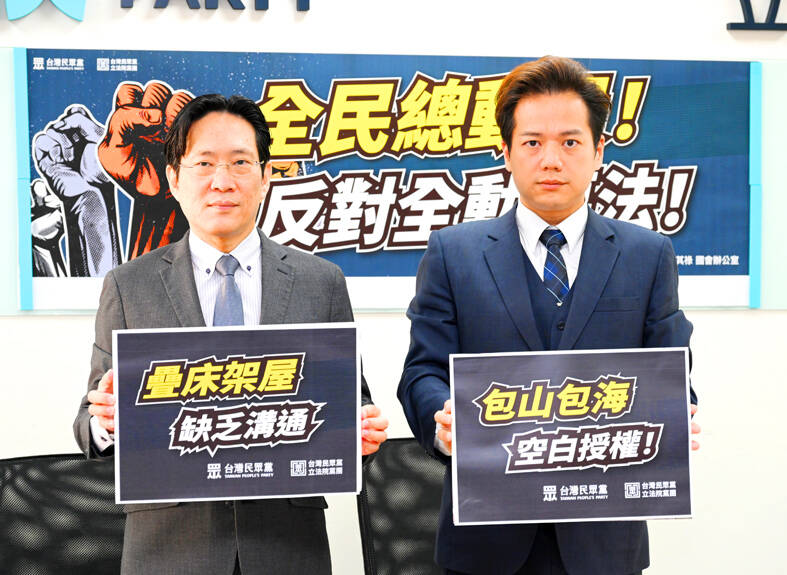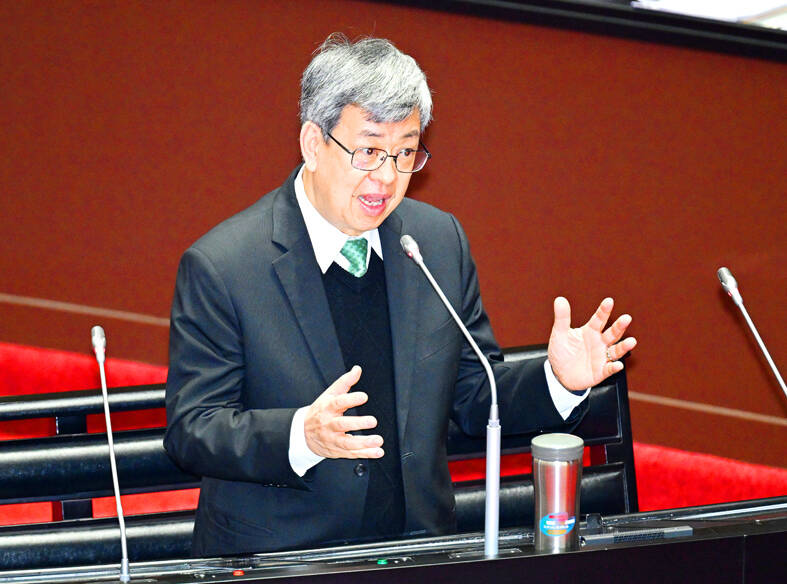The Ministry of National Defense is to take down draft amendments to the General Mobilization Act (全民防衛動員準備法) from its Web site and revise them after considering input from all sides, Premier Chen Chien-jen (陳建仁) said yesterday.
Chen made the remarks in response to independent Legislator Huang Kuo-shu (黃國書) at a question-and-answer session at the Legislative Yuan in Taipei.
The ministry posted the draft on its Web site on Feb. 21. After a mandatory 14-day notice period, it was planning to send it to the Executive Yuan for approval and thereafter to the legislature.

Photo: Tian Yu-hua, Taipei Times
However, Chen said there have been concerns about the draft, adding that the ministry would revise it.
The draft amendments define two phases of mobilization per presidential order — peacetime “mobilization preparation” and emergency or wartime “mobilization implementation.”
Critics took issue with the proposed provision that when the act is activated, local governments and the news media would have to cooperate with the central government, which would be allowed to enforce controls on all information networks, including online media, publishers and TV channels.

Photo: Liao Chen-huei, Taipei Times
As the draft does not clearly define “mobilization preparation,” critics said that the provision could be used by the government to limit press freedom.
Chen said a revision to the act “is what the nation urgently needs, but there was apparent miscommunication about certain aspects of the draft amendments, such as youngsters going to the battlefield or manufacturing arms and restricting the media.”
The ministry should maintain communication with other government departments and communicate with the public on the planned changes, he said.
Separately yesterday, the Taiwan People’s Party (TPP) caucus urged the government to gather more input from all sides before amending the act.
TPP caucus convener Chiu Chen-yuan (邱臣遠) accused the Executive Yuan of only speaking with Democratic Progressive Party (DPP) lawmakers about the issue, calling it “an act indicating that the Executive Yuan is not maintaining administrative neutrality under a DPP-led government.”
Many provisions in the draft overlap with the Civil Defense Act (民防法) and the Disaster Prevention and Protection Act (災害防救法), Chiu said, adding that the draft would give the Executive Yuan “a blank check to do as it pleases.”
TPP Legislator Jang Chyi-lu (張其祿) said modern warfare is conducted in a manner vastly different from World War II, but the amendments show that the government’s mindset is stuck in the past.
The government must abandon the “authoritarian” mindset of “concentrating power to resolve issues of great importance,” Jang said.
Instead it should utilize the strengths of the public to adapt to threats posed by modern warfare, he added.
Additional reporting by CNA

Chinese Nationalist Party (KMT) Chairman Eric Chu (朱立倫), spokeswoman Yang Chih-yu (楊智伃) and Legislator Hsieh Lung-chieh (謝龍介) would be summoned by police for questioning for leading an illegal assembly on Thursday evening last week, Minister of the Interior Liu Shyh-fang (劉世芳) said today. The three KMT officials led an assembly outside the Taipei City Prosecutors’ Office, a restricted area where public assembly is not allowed, protesting the questioning of several KMT staff and searches of KMT headquarters and offices in a recall petition forgery case. Chu, Yang and Hsieh are all suspected of contravening the Assembly and Parade Act (集會遊行法) by holding

PRAISE: Japanese visitor Takashi Kubota said the Taiwanese temple architecture images showcased in the AI Art Gallery were the most impressive displays he saw Taiwan does not have an official pavilion at the World Expo in Osaka, Japan, because of its diplomatic predicament, but the government-backed Tech World pavilion is drawing interest with its unique recreations of works by Taiwanese artists. The pavilion features an artificial intelligence (AI)-based art gallery showcasing works of famous Taiwanese artists from the Japanese colonial period using innovative technologies. Among its main simulated displays are Eastern gouache paintings by Chen Chin (陳進), Lin Yu-shan (林玉山) and Kuo Hsueh-hu (郭雪湖), who were the three young Taiwanese painters selected for the East Asian Painting exhibition in 1927. Gouache is a water-based

Taiwan would welcome the return of Honduras as a diplomatic ally if its next president decides to make such a move, Minister of Foreign Affairs Lin Chia-lung (林佳龍) said yesterday. “Of course, we would welcome Honduras if they want to restore diplomatic ties with Taiwan after their elections,” Lin said at a meeting of the legislature’s Foreign Affairs and National Defense Committee, when asked to comment on statements made by two of the three Honduran presidential candidates during the presidential campaign in the Central American country. Taiwan is paying close attention to the region as a whole in the wake of a

OFF-TARGET: More than 30,000 participants were expected to take part in the Games next month, but only 6,550 foreign and 19,400 Taiwanese athletes have registered Taipei city councilors yesterday blasted the organizers of next month’s World Masters Games over sudden timetable and venue changes, which they said have caused thousands of participants to back out of the international sporting event, among other organizational issues. They also cited visa delays and political interference by China as reasons many foreign athletes are requesting refunds for the event, to be held from May 17 to 30. Jointly organized by the Taipei and New Taipei City governments, the games have been rocked by numerous controversies since preparations began in 2020. Taipei City Councilor Lin Yen-feng (林延鳳) said yesterday that new measures by